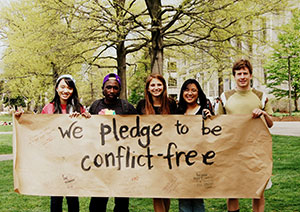
Written by Michael Kinzer and Sarah Palazzolo, co-leaders of American University's Empower Congo which took on the Conflict Free Campus Initiative's (CFCI) campaign.
In 2013, American University (AU) became the first school in the Washington, D.C. area to adopt conflict-free purchasing guidelines. As the co-leaders of the campaign to pass a resolution at AU, we would like to express gratitude for our university's willingness to work with us, and highlight the economic power that students – distinct from the university – have as personal consumers. Please note that our efforts are merely a single part of a much longer road to peace, a road that should not and will not be paved entirely by activists in the West.
Last summer, AU became the first conflict-free university in our nation’s capital when AU President Neil Kerwin publicly announced in his “Mid-Summer Update” that American University:
“will offer preference to suppliers who have made a commitment to conflict-free supply chains when such information (as required by Section 1502 of the Dodd-Frank Wall Street Reform and Consumer Protection Act) is available and when quality and cost performance are equal or superior.”
– Memorandum to Campus Community, 19 July 2013
This statement is the result of years of student activism toward a conflict-free AU. Hundreds of students attended our events, supported our campaigns, and committed to considering conflict minerals the next time they make an electronics purchase. Student activists at other CFCI schools shared their advice and experience with us as a part of this broader movement toward conflict-free higher education.
AU’s Student Senate first passed a conflict-free purchasing resolution in November 2010. Building on the work of former student leaders, we met with a variety of administrators to discuss implementing a conflict-free procurement policy. After numerous conversations with the Procurement and Contracts Director, the Director of Sustainability, the Vice President of Campus Life, and the deans of the School of International Service, we were invited to present our ideas to the President’s Social Responsibility Advisory Committee. We asked the committee to advise President Kerwin to make a public statement reiterating AU’s commitment to implementing existing social responsibility guidelines specifically regarding electronics procurement, which he did in the memorandum above.
The real power of our organization is not on the Board of Trustees, but in the student body. We believe that the lasting value of our activism is outreach at the student level. As consumers of technology, youth do have leverage in the market for electronics. Our campaign for a conflict-free AU focused on informing the decisions of our peers as electronics consumers in addition to focusing on our university as an institution. Through a photo campaign during the spring of 2013, we directly reached over 200 students who took a “pledge” to consider conflict-free purchasing guidelines the next time they go to buy a computer, phone, camera, or other electronics product.
Empower Congo is unique from other CFCI chapters in that we exist as our own student organization. We continue to pour time and energy into inviting the AU community to learn about the DRC in a holistic way. We want to inspire advocates for peace; it is important for students to understand the diverse range of interests, cultures, and histories in the region, rather than simply associating the region with conflict.
Our symbolic accomplishment of a conflict-free American University is significant. Simply by educating more people about the reality of the conflict in the DRC we have begun to contribute to the long process of building a more just society. However, conflict minerals are not the only cause of decades of political and civil conflict in Congo. Congolese civil society actors are doing much more to construct a positive peace in the region; our tiny conflict-free school will not alter the future of peace in Congo on its own. This is why we have encouraged students to think about where their products come from, who is exploited and who gains in the process, and how to advocate for causes we can and should influence.

